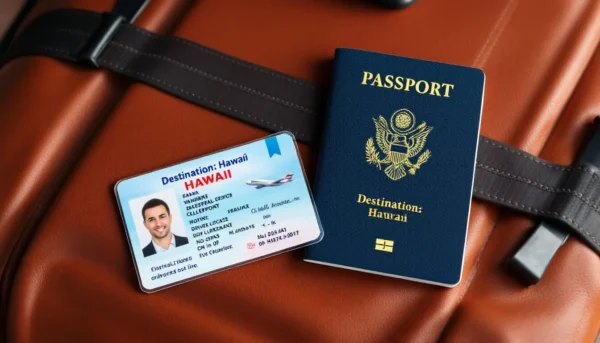Hawaii is best known for Palm trees, turquoise waters, and unforgettable sunsets. These make it one of the most visited destinations in the US. If visiting Hawaii is on your bucket list, you're not alone. The big question is, can Immigrants go to Hawaii? The answer is yes, immigrants can go to Hawaii for work, study, or pleasure, but you must meet the requirements. Whether you're a green card holder, on a visa as an international student or employee, or waiting on asylum status, this guide breaks it all down so you can travel to Hawaii without panic.
Understanding Hawaii's Status
Let's clear up a common misconception that Hawaii is a country. Hawaii is one of the destinations with the best sand beaches in the world, and it's often mistaken for a country, but it is simply the 50th state in the United States. This means you can go to Hawaii just like any other state in the United States, as long as US immigration clears you and you have a legal immigration status.
You don't have to go through thorough immigration checks, passport stamps, or customs lines if you're flying in from another US location. However, because the Pacific Ocean separates Hawaii, you'll still go through airport security, where your immigration status may come into play. Just your proof of identity is enough.
Can Immigrants Legally Travel to Hawaii?

Can immigrants go to Hawaii? The answer is yes. However, specific categories of Immigrants can legally go to Hawaii. If you fall into this category, you probably have a valid immigration status and documentation.
The following is a breakdown of immigrants who are eligible to go to Hawaii:
- A green card holder / permanent resident of the United States. All you need for verification is your green card and a valid ID.
- Immigrants with valid visas, such as tourist, student, or work visas. Just make sure your documents are up to date.
- If you are a Deferred Action for Childhood Arrival (DACA) recipient, you can travel within the US at will, including Hawaii. You need your Employment Authorization Document (EAD) and a valid means of identification.
Do Immigrants Need a Passport to Go to Hawaii?
Since Hawaii is part of the US, you don't need a passport if you're legally in the country. However, the Transportation Security Administration will require a valid photo identification to board your flight.
These identification methods vary based on your residency status and include:
- Permanent Resident Card (Green Card)
- Foreign passport (for visa holders)
- Employment Authorization Document (EAD)
- State-issued ID or driver's license (Real ID compliant)
Documents You Should Carry With You as a Documented Immigrant Traveling to Hawaii?
Although you are not crossing international borders, you must come prepared, as you might be required to present proof of identity. To avoid headaches at the airport during immigration checks, you should go with the following:
- Government-issued photo ID, such as a valid passport.
- Green card, visa, or work permit
- Boarding pass and flight details
- Copies of supporting immigration documents, just in case
Are Immigrants Entitled to the Hawaiian Visa Waiver Program?
The Hawaiian visa waiver program, also known as the Hawaii Conrad 30 J-1 visa, allows foreigners to travel to Hawaii visa-free for tourism or business. However, only citizens from about 38 countries are entitled to this program. All you need to do is get authorised via the Electronic System for Travel Authorization (ESTA) prior to your travel. You can check with the Hawaiian immigration authorities to confirm if your country of residence is one of them.
Can Refugees or Asylum Seekers Travel to Hawaii?
If you're an asylum seeker trying to enter Hawaii, the good news is that you can do that while your case is being processed. Not just Hawaii, but any state in the United States and any location under the US territory.
If your case is approved and you want to travel to Hawaii, ensure you go along with your Form l-94 or your Employment Authorization Document (EAD). If your case is pending, you need to check with your immigration adviser before making any travel plans. This ensures you don't have issues with immigration authorities during your journey. You must also go along with your Form l-589 or an EAD card to confirm your status.
As an approved or pending refugee or asylum seeker, avoid flights with an International stopover. In a case of emergency landing in a country outside the US, ensure you pick up an application for a travel document form (form I-131) to prevent immigration violations in the emergency country.
What are the Challenges Immigrants Might Face When Traveling to Hawaii
When it comes to leaving your country of origin for a new country, challenges are inevitable. Leaving your national origin, where you have all the support, for a country or destination full of uncertainties is not convenient. Here are the common challenges immigrants might face when going to Hawaii.
1. Re-entry Risk
As an immigrant with temporary residency in the US or asylum seeker or refugee with pending case, leaving the US or some US states might be a hassle, as your re-entry is not guaranteed. Going through the airport is inevitable for a state like Hawaii, separated by the Pacific Ocean. As an immigrant, you can't avoid being questioned by immigration authorities, especially if you don't have a permanent residency.
Immigrants under the DACA program with uncertain residency status might be denied re-entry into the US or Hawaii if their status changes while they are away from the country or state. If you're an immigrant processing or waiting for status renewal, you should also be careful about your movement to avoid scrutiny by the immigration authorities.
2. Employment Restriction
One of the challenges immigrants face is the employment issue. Many immigrants travel with the hope of finding a job and settling down. Unfortunately, this might not be feasible due to the restrictions tied to their visa status. For instance, people with a temporary visa are only restricted to the specific type of work stated in their visa. With this clause in place, they cannot take on any other job. Likewise, they won't be able to do any job once their visa expires.
Now let's talk about foreigners who are eligible to work. Getting a job in a state like Hawaii with a saturated labor market is difficult. As an immigrant planning to go to Hawaii, know your limit and avoid working illegally to avoid immigration violations.
3. High Cost of Living
Hawaii might be a tropical paradise, but it comes with a price. For many immigrants, especially those supporting families back home or earning minimum wage, Hawaii might not be the best option because its high cost of living can be overwhelming. Dealing with transportation fares, accommodation, and groceries is a big deal even in the much cheaper state, not to mention an expensive one. If you're an immigrant travelling on a tight budget, you might have to deal with the financial stress of living in Hawaii. The trick to reducing financial stress is to plan ahead of your travel and make your budget as flexible as possible. Also, look for affordable accommodation like hostels or off-season deals.
4. Family Separation
Traveling as an immigrant often involves mixed-status families. Oftentimes, some members are citizens or permanent residents, while others are not. This can lead to heartbreaking decisions when not all members can travel freely. For instance, US-born foreign children can easily visit Hawaii. In contrast, undocumented immigrant parents may not have that freedom to join them due to fear of being exposed to immigration authorities at airports. With these challenges, leaving family behind is inevitable, which might lead to isolation.
5. Language Barrier
English is the means of communication in the US, including Hawaii, and passing the English language proficiency test is compulsory to enter the United States. Language is usually an issue, especially for foreigners from a non-English-speaking environment. Having zero knowledge of the English language can lead to confusion when asking for directions or using public transportation. This might not be an issue for tourists as their stay is just for a short while, and they can use a translation app, but for immigrants who plan to stay for a while, learning the language at least to a certain degree will go a long way.
Tips for a Smooth Trip to Hawaii as an Immigrant
While challenges can be present when traveling to Hawaii as an immigrant, they're not impossible to overcome. All you need is a positive mindset and thorough preparation. The following are practical tips that can help you plan wisely:
1. Plan for Hawaii's Cost of Living
Do you plan to stay in Hawaii for a while, or are you considering a long-term stay? You need to know this to prepare for your stay effectively. There's no doubt that Hawaii is beautiful but expensive, from everyday rides to grocery shopping. If it is ideal for you as an immigrant, ensure you try to cut costs as much as possible. You can consider staying in less expensive accommodations such as hostels and shared apartments. You should also shop at local markets for good grocery deals, and cooking your food instead of eating is another way to cut down on spending.
2. Prepare Your Documents Ahead of Your Travel
Your travel pass is an integral part of your travel. As long as you are not an undocumented immigrant, you won't have an issue with immigration authorities. When planning your trip to Hawaii, ensure all your documents are in order and take them with you, such as your ID card, green card, DACA letters, immigration forms, etc., so you can present them during immigration checks. Also, ensure you have them in digital and printed copies in case of unfortunate circumstances.
3. Keep Emergency Contact at Hand
Things happen when traveling as an immigrant, and you need to prepare for those circumstances. As much as we don't foresee these circumstances, it's always better to plan for them, especially legal emergencies. Ensure you're connected to your legal advisor or lawyer. If you do not have one already, please get one. For a medical emergency, ensure you have a travel and health insurance provider you can contact.
4. Travel Only When Important
This is an important tip to adhere to if your immigration status is pending, you're in the middle of renewal, or you're an undocumented individual. Be sure that the trip to Hawaii is essential or can wait. If it is necessary, you should check with a legal advisor or immigration attorney about potential travel risks.
Conclusion
Hawaii is one of the beautiful cities in the United States, and it has a lot to offer both citizens and immigrants. As immigrants looking to go to Hawaii, ensure you take precautions to avoid immigration issues. Also, make sure your documents are intact with zero problems that could raise eyebrows. Also, check with your legal advisor if you're in a legally sensitive position.
















